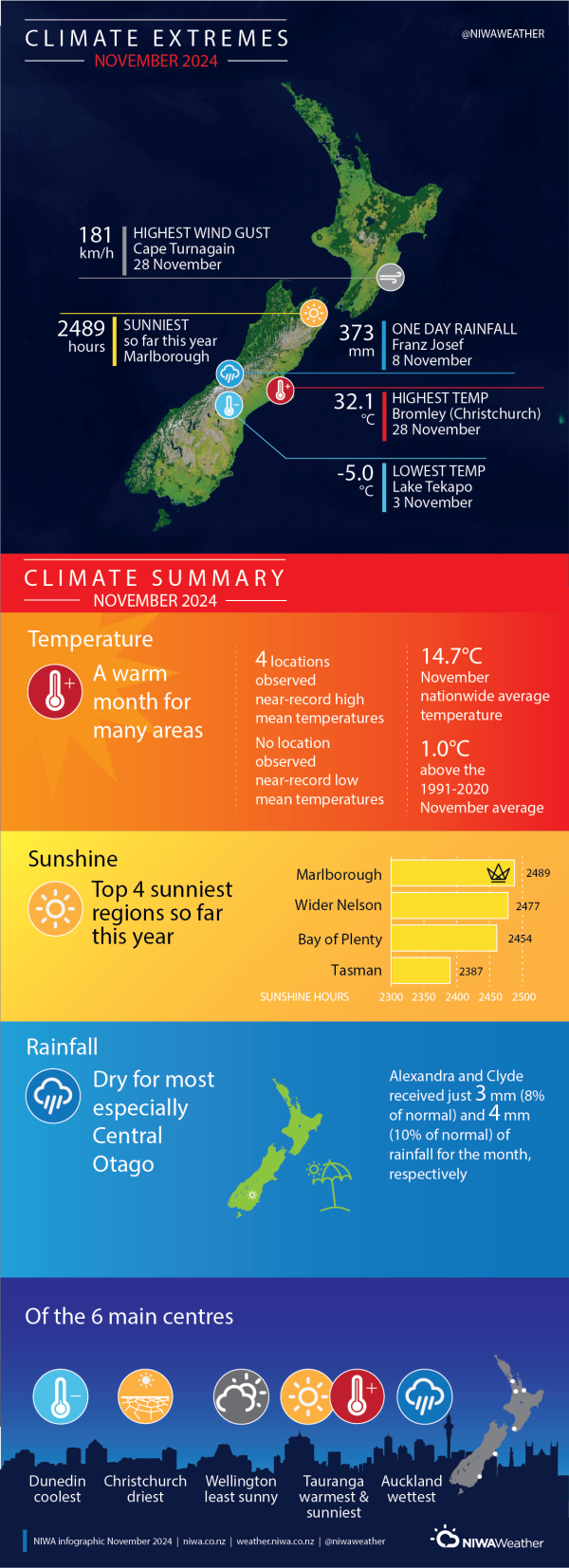Overview
| Rainfall | Rainfall was below normal (50-79% of normal) or well below normal (<50% of normal) for much of the country. Rainfall was above normal (120-149% of normal) or well above normal (>149% of normal) for parts of the West Coast. |
| Temperature | Temperatures were above average (0.51°C to 1.20°C above average) or well above average (>1.20°C above average) for most of the country. Temperatures were near average (±0.50°C of average) in parts of Southland, inland Otago, the West Coast, and northeastern Northland. |
| Soil Moisture | At the end of November, soil moisture levels were below normal for northern, inland, and eastern parts of the North Island, as well as central and northern parts of Canterbury. Above normal soil moisture levels were observed in southern and western parts of Southland, and eastern parts of Otago. Elsewhere, near normal soil moisture levels were typically observed. |
November 2024 was characterised by a large belt of higher-than-normal mean sea level pressure that straddled Aotearoa New Zealand and the surrounding seas. This pressure setup resulted in a relatively calm and settled month of weather for the country, with warm temperatures and relatively little rainfall for many areas. There were slightly more easterly airflows than normal for northern parts of the North Island, with more northwesterly airflows for the lower half of the South Island.
Rainfall was below normal (50-79% of normal) or well below normal (<50% of normal) for much of the country. It was especially dry for parts of Central Otago, northern Canterbury, and coastal Wairarapa, where rainfall was less than 20% of normal for November. Rainfall was above normal (120-149% of normal) or well above normal (>149% of normal) for parts of the West Coast, largely due to a significant rainfall event in early November that resulted in a local state of emergency (see Highlights and extreme events section for further details). Rainfall was near normal (80-119% of normal) for parts of Waikato, Taranaki, Kāpiti Coast, and isolated parts of southern Otago and Southand.
Temperatures were above average (0.51°C to 1.20°C above average) or well above average (>1.20°C above average) for most of the country. The exception was parts of Southland, inland Otago, the West Coast, and northeastern Northland, where temperatures were near average (±0.50°C of average). The nationwide average temperature in November 2024 was 14.7°C. This was 1.0°C above the 1991-2020 November average, making it New Zealand’s 13th-warmest November since NIWA’s seven station temperature series began in 1909.
Further Highlights:
- The highest November temperature was 32.1°C, observed at Bromley (Christchurch) on 28 November.
- The lowest November temperature was -5.0°C, observed at Lake Tekapo on 3 November.
- The highest 1-day rainfall was 373 mm, recorded at Franz Josef on 8 November.
- The highest wind gust was 181 km/h, observed at Cape Turnagain on 28 November.
- Of the available, regularly reporting sunshine observation sites, the sunniest four regions in 2024 so far are Marlborough (2489 hours), wider Nelson (2477 hours), Bay of Plenty (2454 hours), and Tasman (2387 hours).
- Of the six main centres in November 2024, Tauranga was the warmest and sunniest, Dunedin was the coolest, Auckland was the wettest, Christchurch was the driest, and Wellington was the least sunny.


